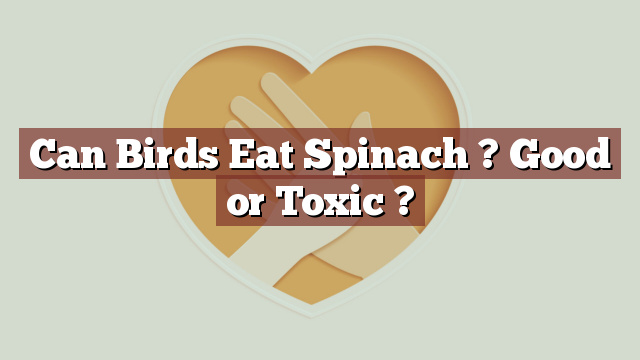Can Birds Eat Spinach? Good or Toxic?
Knowing which foods are safe for our pets is of utmost importance to ensure their health and well-being. In the case of birds, it is essential to understand the impact of different foods on their diet. One such food that often raises questions is spinach. In this article, we will explore the nutritional value of spinach for birds, whether it is safe for them to eat or toxic, the potential risks and benefits associated with feeding birds spinach, and what to do if a bird consumes spinach.
Nutritional Value of Spinach for Birds
Spinach is widely recognized as a highly nutritious vegetable for humans, packed with essential vitamins and minerals. Similarly, it can provide some nutritional benefits to birds as well. Spinach is rich in vitamins A, C, and K, as well as minerals like iron, calcium, and potassium. Additionally, it contains antioxidants and dietary fiber. These nutrients are vital for a bird’s overall health, including proper growth, feather maintenance, and a strong immune system.
Is Spinach Safe for Birds to Eat or Toxic?
Yes, birds can eat spinach. Unlike some other foods that may be harmful to birds, spinach is generally safe for them to consume. However, it is important to note that spinach should be offered in moderation as part of a varied diet. Providing a balanced diet that includes a wide range of vegetables, fruits, seeds, and pellets is crucial for meeting a bird’s nutritional requirements.
Potential Risks and Benefits of Feeding Birds Spinach
While spinach offers several health benefits, it also carries some potential risks when fed excessively. Spinach contains oxalic acid, which in large amounts can interfere with calcium absorption. This may lead to the formation of calcium oxalate crystals, which can cause kidney or urinary tract issues in birds. To mitigate this risk, it is essential to offer spinach as part of a diverse diet, ensuring that other calcium-rich foods are also provided.
On the flip side, the high nutritional value of spinach can enhance a bird’s overall well-being. The antioxidants present in spinach help in combating oxidative stress, reducing the risk of certain diseases. The fiber content aids in digestion and promotes a healthy gut. Moreover, the vitamins and minerals in spinach contribute to maintaining strong bones, vibrant feathers, and a robust immune system.
What to Do if a Bird Eats Spinach
If a bird consumes spinach, there is generally no cause for immediate concern. However, it is crucial to monitor their behavior and health. If any signs of distress, such as vomiting, diarrhea, or lethargy, are observed, it is advisable to consult a veterinarian promptly. A vet can provide professional advice and assess the situation to ensure the bird’s well-being.
Conclusion: Spinach can be a Nutritious Addition to a Bird’s Diet
In conclusion, birds can safely eat spinach as part of a balanced diet. Spinach offers valuable nutrients that support a bird’s overall health. However, it should be provided in moderation to avoid potential risks associated with excessive oxalic acid consumption. By offering spinach alongside other nutritious foods, bird owners can ensure their feathered friends receive a well-rounded diet. As with any dietary changes or concerns, it is always best to consult a veterinarian for tailored advice and guidance.
Thank you for investing your time in exploring [page_title] on Can-Eat.org. Our goal is to provide readers like you with thorough and reliable information about various dietary topics. Each article, including [page_title], stems from diligent research and a passion for understanding the nuances of our food choices. We believe that knowledge is a vital step towards making informed and healthy decisions. However, while "[page_title]" sheds light on its specific topic, it's crucial to remember that everyone's body reacts differently to foods and dietary changes. What might be beneficial for one person could have different effects on another. Before you consider integrating suggestions or insights from "[page_title]" into your diet, it's always wise to consult with a nutritionist or healthcare professional. Their specialized knowledge ensures that you're making choices best suited to your individual health needs. As you navigate [page_title], be mindful of potential allergies, intolerances, or unique dietary requirements you may have. No singular article can capture the vast diversity of human health, and individualized guidance is invaluable. The content provided in [page_title] serves as a general guide. It is not, by any means, a substitute for personalized medical or nutritional advice. Your health should always be the top priority, and professional guidance is the best path forward. In your journey towards a balanced and nutritious lifestyle, we hope that [page_title] serves as a helpful stepping stone. Remember, informed decisions lead to healthier outcomes. Thank you for trusting Can-Eat.org. Continue exploring, learning, and prioritizing your health. Cheers to a well-informed and healthier future!

